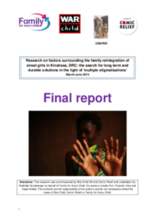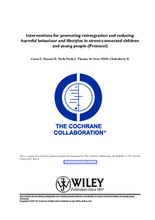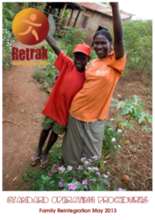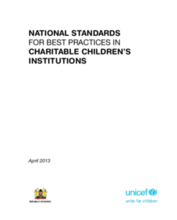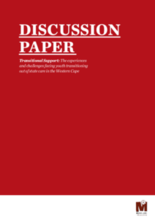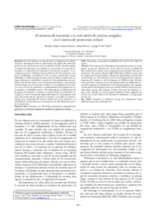Displaying 901 - 910 of 992
In this TED talk, Lemn Sissay recalls his experiences of the care system, the search for his birth family and the insights this has given him.
This research looked at the factors affecting the family reintegration of girls in the Tshangu district of Kinshasa (DRC), an operational zone of the local NGO OSEPER, a partner of War Child for a 3-year project, seeking to address the needs of street-connected girls, including family reintegration.
The multidimensional standardised assessment tool, the North Carolina Family Assessment Scale—Reunification (NCFAS-R) was used in this study by practitioners to assess family strengths and needs in case planning and reunification decision making. The current paper examined (1) whether NCFAS-R domain ratings at intake and closure differ by characteristics of parents and children; and (2) whether reunification is predicted by NCFAS-R score at closure.
This systematic review, co-registered within both the Cochrane and Campbell Collaborations, summarizes the evidence from empirical studies comparing the effectiveness of interventions that have been established to promote inclusion and reintegration, and to reduce harm, in street-connected children and young people (who work and/or live on the streets) worldwide. The review includes 11 studies, evaluating 12 interventions from high income countries. No studies from middle and low income countries are included due to inadequate quality of available studies.
Retrak, a UK-based organization working with street children in Africa, has published an excellent practical manual detailing its standard operating procedures (SOPs) for family reintegration for children working or living on the street. This document includes guiding principles of family reintegration, key steps, tools, monitoring and evaluation, as well as variations on the key steps of family reintegration.
This document was developed with the aim of assisting Charitable Children’s Institutions (CCIs) in Kenya to boost their capacity for determining which children need to be admitted into CCIs, how to provide adequate care and protection to the children and how to plan the eventual exit of the children back to their families and communities.
This report, published by the National Society for the Prevention of Cruelty to Children (NSPCC) in the UK, highlights the need to improve outcomes for children leaving care and returning to parents or families. The NSPCC provides recommendations for policymakers and practitioners to improve the quality of assessment, planning, and preparation regarding when and if a child should be returned home from care and to increase the support for children and their families once they return to their families.
In 2012, Mamelani began an assessment of the content and focus of its transitional support programme. The aim was to consolidate its existing practice as well as to discover and implement new ways of ensuring more participants in its programme make a successful transition out of care.
En este artículo se revisan diversas investigaciones de carácter nacional de España e internacional sobre los adolescentes que egresan del sistema de protección.
This article provides an outline of the early development of care and protection in Australia and New Zealand as a backdrop to an overview of child protection systems and policies and the current child protection profile in both countries. An overview of trends in relation to out of home care, including routes into care, care arrangements and permanency policies is provided.

